Andrea Bocelli on the healing power of music and the importance of his religious faith


Father and daughter, with Andrea playing the guitar, sat on a candle-lit stage in the majestic surroundings of the Teatro Regio di Parma opera house in Italy, where they performed a simple, yet deeply moving, rendition of Leonard Cohen’s haunting song.
The livestream performance was part of Bocelli’s Believe in Christmas show, which sold more than 70,000 tickets to a global audience from 120 countries, making it the most successful online ticketed classical event of all time.
Advertisement
Hide AdAdvertisement
Hide AdThe concert featured special guests including award-winning mezzo-soprano Cecilia Bartoli, Clara Barbier Serrano and Virginia – making her first public performance – alongside a full orchestral accompaniment.


It came on the back of Bocelli’s latest album, Believe, which is heavily inspired by his spirituality and Catholic faith and features both Bartoli and acclaimed singer and musician Alison Krauss.
The idea for the album, says Bocelli, came last March during the first pandemic lockdown. “I was sitting at the piano by myself, working through my bewilderment and anxiety about what was happening in the world, and as I played, a melody gushed out of my heart and that became Ave Maria on the album.
“I understood that, as an artist, the only way to make my own contribution at this difficult and uncertain time in history, was to continue to make music with the utmost commitment.”
Advertisement
Hide AdAdvertisement
Hide AdThe subsequent album centres on music with a spiritual connection and features such anthemic standards as Amazing Grace and You’ll Never Walk Alone. “Amazing Grace is a marvellous hymn of thanks, the story of a conversion, the parable of a man who decided to transition from evil to good,” says Bocelli.
“It was conceived in the 18th century, but its power still stirs us and moves us with equal force today. You’ll Never Walk Alone, on the other hand, began life as a song in a musical, but it soon became a global song of courage, union, hope and trust in the future. And that is what we need today more than ever.”
Bocelli has collaborated with everyone from Tony Bennett to Ariana Grande and enjoyed working with both Bartoli and Krauss on his latest record.
“They are two great voices and I’m honoured to have been able to sing duets with them. It isn’t the first time I’ve sung together with Cecilia Bartoli. She’s a friend and I’m happy to have been able to celebrate our friendship and mutual esteem through recording two songs of rare beauty. As for Alison Krauss, naturally I’ve followed her amazing career, and it was great to join forces here on a very stirring version of Amazing Grace, with new orchestration specially created.”
Advertisement
Hide AdAdvertisement
Hide AdThough it includes several well-known and iconic songs, he feels his new album is an experimental one in some respects.
“We didn’t set any limits with regard to time, genre or place. We chose pieces that we believe carry with them a divine inspiration, that can speak to the heart. Works by great composers from the past, from Fauré to Bizet, and a newly discovered piece by Puccini, but also contemporary pieces such as one of the last compositions by Ennio Morricone before he left us, or Hallelujah by Leonard Cohen, which is certainly not sacred music, but which still carries with it a spiritual message.”
And in these challenging times, he felt this was important. “This is the guiding theme: music and words to rediscover hope, to help us consider that every crisis can become an opportunity. With the pandemic, the world seems to have wanted to give us a warning.
"It’s up to us to take that lesson to heart and to change our attitude to life, bringing to the fore those values that are new, yet very old, that many religions uphold – because there is one God, whatever name may be used to invoke him – and that I, personally, find in the Gospel.”
Advertisement
Hide AdAdvertisement
Hide AdBocelli’s life and career has been remarkable. Born in 1958, he suffered problems with his sight as a young child and became completely blind when he was 12, after being hit on the head during a football match.
By this time his musical talent was already evident. He began playing the piano when he was six. Other instruments followed, but none had more impact on Bocelli and his audience than the instrument with which he pursued his career – his voice. When he was 12 he won a competition with a rendition of O Sole Mio. The early success convinced Bocelli to pursue proper training to make his voice the best it could be and he was taken under the wing of Franco Corelli.
Bocelli doesn’t talk about his blindness in interviews but his proclivity for music must have given succour to him when faced with challenges over the years. “It has been very important for me in every phase of my life. I can truly say, without exaggeration, that music is a friend that has always accompanied me. It’s a universal language, a powerful instrument and I believe that music can educate all of us about beauty, it can help us overcome difficulties, it can open our minds and hearts,” he says.
“Knowing that I had a talent for singing led me to make headway, even while still a child. My friends and relatives would always ask me to perform and their insistence often made me think, ‘Maybe that’s something I’ll do for a living?’ I can still hear the words of my much-loved primary school teacher: ‘Remember, Andrea, that the good Lord has given you a gift, and you haven’t done anything to deserve that gift.’ It was a very wise lesson that I have never forgotten.”
Advertisement
Hide AdAdvertisement
Hide AdLike his musical talents, his faith has been a constant in his life. “Faith is humility and a sense of wonder. It’s that impulse towards the heaven that is above us, and towards the one within us: that deepest, most unknowable and immortal part of us that is the soul.
"Faith is fundamental, it is the centre of gravity of my life and it affects the private dimension as well as the professional dimension. As a practising Catholic, I believe in the power of three remarkable words: faith, as we’ve said, hope and charity.”
It is these three principles that lie at the heart of his music, and something he hopes listeners will find in his new album. “I will say again that it is my hope that these pieces will bring a moment of comfort and optimism. Optimism is always a winning attitude and fear is the only thing that we should be afraid of.
“Music, like all art in fact, in the sense of the impulse towards beauty, can restore faith in the future... When it comes down to it, art and beauty are a human right.”
Believe is out now.